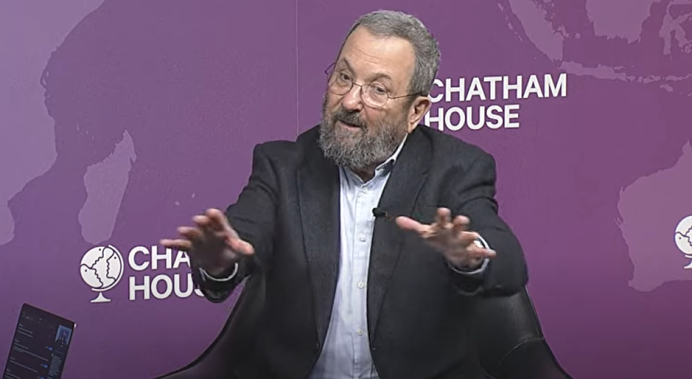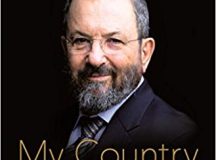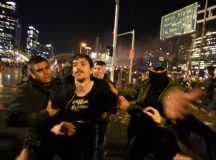Last week, on the day a general strike was called in response to the sacking of Defence Minister Yoav Gallant, Chatham House hosted former Israeli Prime Minister Ehud Barak. Fathom Deputy Editor Jack Omer-Jackaman reflects on what Barak had to say about the judicial reforms and the protest movement, his career, and his relationship with Prime Minister Netanyahu.
‘We Will Win’
Ehud Barak and I arrive at London’s Chatham House at the same time, and while I make my way to the punter’s entrance on ever-decorous St James Square, Barak, his wife, and his bodyguard are having trouble locating what passes for the stage door. The head swivels, the brow furrows, but there is no equivocation; none of that ponderousness of gait that so clearly signals lostness in the rest of us. He continues to walk confidently and determinedly, as if to say: ‘where I am going, that is where the door shall be; and if not, I shall make one.’ The former Israeli Prime Minister is, as ever, on a mission.
Barak, typically, is the sort of man for whom Chatham House was made. Urbane, frank, vastly experienced, possessed of a nuanced and capacious command of regional and global developments; he is a genuine intellectual. Margaret Thatcher was mocked for saying that her retirement treat was a re-reading of Frederick Forsyth, politicians being expected to indulge in something more challenging and sophisticated, even for pleasure. Barak favours Goethe, and during the course of his remarks is charitably confident that many in the audience are as fully conversant with the thought of Max Weber as he is. Barak the giant brain, Barak the analyst are what Chatham House expects: they are not what Chatham House gets. He is one of politics’ few true foxes, but here he turns hedgehog: none of the wide-ranging flights of erudition, none of the always enlightening tangential discursions. He is here as an envoy for the Israeli protest movement and equipped with a politician’s message discipline. To whit: Israel is threatened with catastrophe, but we are going so to save it.
The timing is perfect: it is the day, after the night. The day on which Israel is brought to a standstill by a general strike, after the night’s explosion of rebellion in which over 600,000 took to the streets, seemingly fairly organically, following Prime Minister Netanyahu’s sacking (at time of writing it’s still unclear if it stands) of Defence Minister Yoav Gallant. The Histadrut has called everyone out, flights are grounded at Ben Gurion, and as we take our seats my colleague informs me that even the London embassy has downed tools. It is the culmination, though far from an inevitable one, of the outpouring of rage and protest from those Israelis opposed to the government’s judicial reforms, and Barak is giddy. He has, from the start, positioned himself as one of the protest’s side-line-leaders, providing military-political heft to the argument, which he makes explicit here, that the reforms are an effort to destroy Israeli democracy from within and institute a dictatorship. It is, he says, a profound threat to national life and security; so profound as to constitute, despite the wars and intifadas, the greatest crisis since Israel’s birth.
He speaks before Netanyahu has addressed the nation to announce a pause on the reforms; a halt on which analysts are divided as to whether it is a great win for the protest movement or a classic Bibi act of calculation to stall its momentum before resuming the reforms, as currently framed, full-speed. But Barak is optimistic, bullish even. ‘We will win, I know our people,’ he says. Israelis will succeed in preventing the pyromaniac coalition’s attempts to ‘push Israel out of the family of democratic nations’. The protests, he argues, have reached a critical mass. Characteristically, he comes armed with academic support, citing a study which shows that protest movements garnering the regular and active support of at least 3.5 per cent of the population (8 per cent of adults) invariably succeed. This, the movement has achieved: democracy in action. To the notion that the Israeli people spoke loudly in November and that, in fact, the democratic will of the Israel people is being thwarted, he offered a simple retort: Bibi campaigned on Iran, Saudi, housing, and cost of living. Not judicial reform.
Repeated efforts to draw him on the Palestinian question are only partially satisfied, before he reverts to his real topic. He remains a firm two-stater, and an eternally optimistic one at that. The solution hasn’t changed: when two states finally comes, he assures us, you will need a magnifying glass to see any differences with the Camp David / Clinton Parameters / Taba proposals. On the collapse of that doomed process he is firm in denying any responsibility: I never told Arafat take it or leave it, he insists. There is genuine wistfulness and regret in the lives and time wasted. People will ask, he says, why did it take so long, and so many bodies, to reach the only possible agreement?
He has surprisingly warm words for Mahmoud Abbas – ‘basically a good person with many mistakes’ – but surprisingly few for the crumbling edifice of the Palestinian Authority and Abbas’s waning, sclerotic leadership, both of which are already bringing profound and baleful consequences for both Israelis and West Bankers. He champions the traditional wisdom of improving the Palestinian economy as a deterrent to terror and inspirer of hope (the same logic re-stated by the defenestrated Gallant last month). Peace, or at least its process, will come when Israelis and Palestinians feel ‘self-confident’. Alas, Barak’s singularity of purpose here precludes a proper interrogation of how tragically and self-evidently lacking that commodity is for both right now.
At the third or fourth attempt to get him to focus on the Palestinians, he smiles; a smile which says ‘you guys don’t get it do you, don’t get what’s at stake here.’ So he spells it out: the Palestinian question is irrelevant if Israel is a dictatorship. This is a battle rendering all others secondary. The Palestinians must be patient, he says, to an audibly shocked murmur. (An English audience, however interested, tends to underestimate the extent to which the Israeli consensus has temporarily given up on the practicalities of implementing two-states in any case, and how low a priority it was even before the judicial crisis. Perceptions of the Palestinian national movement as fanatically irredentist and rejectionist, and of disengagement as a disaster, cut across political divides in Israel.)
Barak acknowledges the importance of a question on Smotrich’s enthroning in the West Bank, and on the implications of a potential transfer from military to civilian Israeli rule. Smotrich wants a religious war, he says. But then it’s back on message to what really concerns him most about the West Bank today: the prospect of the reforms resulting in Israelis being marched to The Hague. For if the reforms are enacted then the previously high international standing of the Israeli judiciary ends and calls to subject Israeli soldiers to international jurisprudence grow in volume and legitimacy. No longer will Israel be trusted to judge its own. He says he fears even for himself under such circumstances. I don’t know if this is rhetoric designed to reinforce a point made regularly by reform opponents, or a genuine fear that previous publicity-seeking attempts to issue a warrant for his arrest while in London will now have some teeth. Regardless, all discussions lead back, inevitably, to the reforms.
Trust the soldiers
The source of Barak’s confidence in the ultimate defeat of the judicial revolution is telling, and beautifully, uniquely Israeli. His has always been the kind of extraordinary combination of cerebral and martial prowess that only Zionism and the early state of Israel could have produced. At Chatham House – though one can see the aesthete, the intellectual, the pianist, and the analyst – the soldier is the dominant Barak. (The bodyguard is truly giant, but it’s Barak, at 81, that I’d rather have with me in a tight spot.) And his faith is a soldier’s faith. Not just the army itself, but the spirit of the army is what is most offended by the reforms. The army is therefore the guarantor of their defeat. Not only the IDF, but the Mossad, the GSS – all are led by fellow Sayeret Matkal alumni, whose number also includes leaders of the protests: ‘Solid characters’, says Barak. Solidity. The old sabra sangfroid. Holding the line. This stuff does not fly in that Israel. An implied contrast is made between this ‘solidity’ and the revolutionaries: not only Smotrich and Ben Gvir – called ‘lunatics’ more than once – but Levin and Rothman, too: none of them military men.
There is regret that Bibi was solid once but no more. ‘Quite a good officer…’, says Barak wistfully, his words trailing away. Solid Israel no longer has any trust in Bibi, he says, pointing to his head in clear insinuation that the judgement is gone. His anger is fiercest when touching on Netanyahu’s refusal to accede to Gallant’s demand, made the weekend before last, that the security cabinet be convened. The eyes flash, the body tenses: ‘You dare…’ You dare, Mr Security, with division and recusal from service rife? And while Iran is a de facto nuclear-threshold state? And while the West Bank is in chaos and burgeoning with a fresh generation of would-be terrorists beyond the control of the PA? And with Hezbollah having provided fresh evidence of its continued murderousness and ability to penetrate beyond the northern frontier? With all this, you dare refuse to convene a cabinet which has not met since 12 February?
No wonder the military and intelligence establishments are balking, says Barak. And if forced to choose between the orders of the government and those of the Supreme Court they will follow the court. And quite rightly, for Barak. Civil disobedience, he says, is baked into Israel’s military ethos: when faced with a blatantly illegitimate order – one that has a black flag hanging over it – you have an obligation to refuse. You see Bibi? Not anarchists, just good soldiers and faithful upholders of the purity of arms. But as important as the top brass is, it’s the reservists who hold the crucial power. He explains to his audience quite how much soldiering is done in Israel by them, and not by enlisted or career men. If Hezbollah or Hamas show up, they’ll fight, of course. But their current bread and butter, the ‘Campaign between the Wars’ – that innovation of reform opponents Gantz and Eisenkot – there they will refuse to serve. And that won’t stand.
Trust in the soldiers: they will stop Bibi.
Barak and Bibi
These two national giants have been through a lot together, and been through a lot in opposition to one another. Theirs is an almost Shakespearean dynamic, and their temperamental similarities are as fascinating as their differences – one of which now delivers an intriguing irony.
Barak commanded Bibi in Sayeret Matkal. They shared a number of its triumphs, including Lod (a mission for which Bibi now claims Barak overstates his role). Then came the loss, devastating to both, as it was to the nation, of Yoni at Entebbe. The mid-1990s pitted them in direct opposition: Bibi as prime minister and leader of Likud, Barak as leader of the opposition and head of Labor. It might have been otherwise: Barak was said to be open to bringing Labor into Netanyahu’s first government and serving as Defence Minister. Netanyahu demurred but was tempted by the prospect of not having to include the religious parties in the government – a reluctance he has ever since overcome.
Barak then ran against him in 1999, on a platform committed to withdrawal from Lebanon and marked by an anti-Haredim tone. Netanyahu, for his part, was both the great Americaniser of Israeli politics and also something of a demilitariser. His disregard for the military elite and side-lining of them from cabinet meetings and negotiations with the Palestinians led many into Barak’s waiting arms – an interesting recollection given Barak’s estimation that the military will thwart Bibi this time. That and, as Bibi saw it, the support of the Clinton White House led him to defeat and Barak to victory and the prime ministership in 1999. (Netanyahu neither forget nor forgave the Clinton intervention.) Cue Bibi’s wilderness years.
Loss to Sharon then brought Barak’s own political exile, before a return saw him serve as Defence Minister under Olmert, picking up the pieces of a disastrous 2006 Lebanon campaign and overseeing Operation Cast Lead in 2008. When Bibi replaced Olmert in 2009, Barak stayed on and the two recent adversaries were comrades once again, united by a shared antipathy to Tzipi Livni and by Barak’s conversion into an Iran hawk.
Barak’s popularity in Israel is glaringly incommensurate with his national contribution – the brain, the intolerance of others, and the faith in the rightness of his own vision leading to charges of arrogance from critics, and a few admirers: the Napoleon nickname was only partly a complimentary acknowledgement of military acumen. Veteran commentator Nahum Barnea once accused him of not knowing the difference between ‘being smart and being a smartass’. ‘Too clever, too calculating, and wrongly conceived of as being inhuman’, wrote Ari Shavit in 2008. Asked his own greatest weakness at Chatham House, he first quips that it was losing (in 2001), before conceding that the headstrong single-mindedness tended to leave others feeling slighted: ‘men are frozen teenagers’, is his beautifully Barakian and rather self-exculpatory explanation; egos need massaging and he struggled to do it.
Arrogant? Clever? Calculating? Self-promoting? Prone to alienation? We’ve seen these same critiques applied to Netanyahu, many times over. They do indeed share similarities, and actually got on well for a time. As prime and defence minister, they were in virtual lockstep over the necessity of an early strike on Tehran’s nuclear programme and virtually prepared to declare war without cabinet approval, much to the dismay of Mossad and Shin Bet heads Meir Dagan and Yuval Diskin. They were thwarted. Drawn on the Iranian situation today, Barak is uncharacteristically fatalistic. He decries as ‘grand negligence’ the Trump-Netanyahu withdrawal from JCPOA, and avers that there is no true surgical operation plan available to delay a nuke. An attack would be symbolic. Arak could be destroyed, but to what use? Such would not meet the requirements of the Begin Doctrine since it would not really thwart the nuclear programme; in fact, an attack could provide international legitimisation for its acceleration. He doesn’t say it, but those with knowledge of the Barak-Iran form can hear a giant ‘I told you so’ between the lines.
If there are some temperamental similarities, then the glaring difference between them – aside from personal rivalry – used to be a question of temperament, too. Barak’s memoir reports him mocking Bibi for a crippling paranoia, leading to an excess of caution fatal in a leader. ‘Your behaviour’, he claims to have once said to him, is ‘living proof that it is easier to take the Jews out of the galut than it is to take the galut out of the Jews’. Not daring enough, not sabra enough. Barak, on the other hand, has spent a lifetime making bold and unpopular decisions, with risk always relished. He was like this from the start. As a young soldier, he was initially allocated to an armoured infantry battalion, until the commanders of a still-infant Sayeret Matkal were alerted to reports of a young recruit who had fashioned his own lock picks to raid ammunition from his kibbutz’s armoury. His rise was fast and marked by repeated contempt for generals and other seniors, and an inclination to risk and to exhort others to risk. Leading a 1963 mission to install a listening device in the Syrian Golan, orders came through over the radio that conditions were too dangerous and to return to base. Barak’s response was to order the radios silenced and to proceed, to great success.
So too in politics. The withdrawal from Lebanon was divisive but Barak ploughed on. At Camp David and Taba he authorised unprecedented concessions to the Palestinians and would have followed through as a price worth paying for an uncoupling. (Before losing to Sharon, but after having given up on a capricious Arafat as a partner, he drew up a unilateral disengagement plan, withdrawing from the West Bank but keeping 80-85 per cent of settlements.) This disregard of risky consequence is Barak; it was not Bibi.
For here comes the irony. As my colleague Calev Ben-Dor recently noted, one of the things most remarked on by Israelis in these days of tumult and drama is just how out of (traditional) character all this is for Netanyahu. Caution, pragmatism, calculation, aversion to risk, political acumen: these are the typical Netanyahu tropes. Revolution? Knowingly courting mass unrest? Spooking the markets? Alienating allies? Who is this Netanyahu, this status-quo-shatterer? Barak-the-rebel, meanwhile, leads the charge against his recklessness and in defence of the existing order, the ‘elites’. It’s jarring. Barak would no doubt make a distinction: risk the nation for the good of the nation, on occasion (and even if the nation doesn’t yet know what’s good for it); never in service of your own self-interest. He is clear that this is what is driving Bibi, his observation that 97 per cent of criminal cases in Israel end in a guilty verdict far from a meaningless aside.
Whatever the ironies and psycho-dynamics, one thing is clear: in the last decade the Barak-Bibi relationship has not so much cooled as frozen, the mutual contempt played out in public and in ever more vituperative terms.
As Many Questions as Answers
Barak rises, done with us, off to the next assignment on his latest mission as anti-reform envoy. I leave with as many questions as answers. Is he right? Will the protests prevail? What does prevailing even look like? No reforms? Softened reforms? More broadly, is he right in his estimation of the strength of old Israel, solid Israel? Benny Gantz – a decent representative of solid Israel – is certainly the big victor of last week’s polls which show not only a kicking for the Likud and the coalition, but a boost for his rather unshowy brand of traditionalism. I’d thought Lapid the obvious post-Bibi alternative but perhaps Barak has it right. To some, Gantz seems perhaps to be best embodying a spirit of mamlachtiyut right now (a common Israeli expression whose English translation is, as so often, rather unsatisfactory: the sublimation of all other interests to those of the state is a fair, though imperfect, approximation).
My default temptation – never fully checked by self-exhortation to scholarly rigour – is to assume that Barak must have it right. It’s not just the talent, which is such that we must always be left wondering if it might have been put to even greater use than it has been. It is that he has not only seen Israel from its inception and witnessed its truly epochal moments, but been bang in the centre of many of them. His is, even in a nation whose circumstances force many of its sons and daughters to live lives beyond the ordinary, a remarkable life. From Kibbutz Mishmar HaSharon to Beit Aghion, via service as a commander in 1967 and 1973; the command of the Sayeret Matkal and senior roles at Lod, Entebbe, and in the 1973 raid on Lebanon (Barak, dressed as a woman, landed an small team in Beirut and oversaw the assassinations of three high-ranking PLO officials); the 1982 Siege of Beirut; the 1988 raid on Tunis to take out Abu Jihad; head of the Military Intelligence Directorate; head of Central Command; Chief of the IDF General Staff. Enough already for one life, surely? But then came the politics: Minister of Internal Affairs; Minister of Foreign Affairs. Then Prime Minister, then Minister of Defence (he is Israel’s second longest-serving holder of the office, after Ben Gurion).
Predicting the outcome of all this is a fool’s errand; but if anyone knows, surely it is Barak.






































Editor Omer-Jackaman seems so enamored to have gotten some time with Barak that he’s lionized a second rate has-been who was never in the same league as Bibi. The comparison is spurious; Barak was an occasional high-profile figure including his most important (brief) moment when he was busted trying to give away the store to Arab rejectionists in order to be adored on the world stage. He was rightfully never trusted again by the Israeli electorate (or fully, by Bibi, himself) and has become such a stick-in-the-mud in his old age that he spends his time in futile attempts to savage the reputation of Israel’s only living global statesman.
Shame on him.